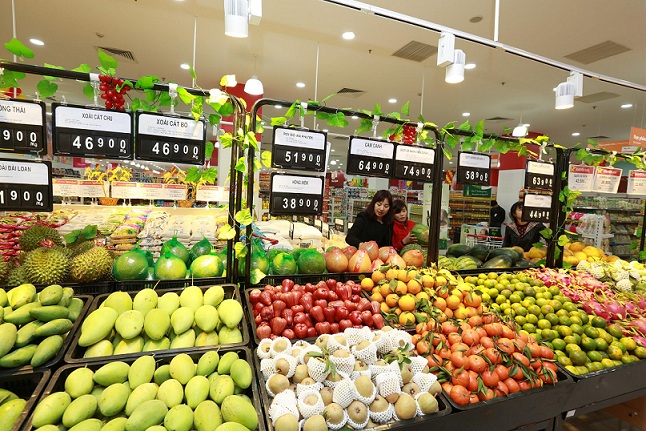New Year skips traditional CPI increase
 |
During January 2017 there have been two upward adjustments in oil and gasoline prices. Will these exert an upward pressure on the CPI in the first months of the year?
On January 4, 2017, the price of A95 gas and other oil products increased by VND300-500 (US cent13-22) per litre, which also led to the rise of the CPI in January by approximately 0.03 percentage points. Then on January 19 2017, diesel oil grew by VND290 per litre, which generally left the CPI unaffected. In summary, the two upward adjustments in January have proven inconsequential.
How do you think will the rising medical services prices impact the CPI?
In December 2016, the Ministry of Health adjusted the price of medical services in 4 provinces (the price in 27 more provinces would be adjusted later in 2017). Step 1 (including direct costs and some allowances to medical workers) has already been implemented, and step 2 (comprising of direct costs, allowances to medical workers, and wages in 36 provinces) is currently in work , therefore, the price of medical services increased by 77.57 per cent in 2016, making up 2.7 percentage points of the overall growth in CPI during the year, which was 4.74 per cent. Step 2 of the adjustment in some locations this year will put further upward pressure on the CPI, however, at a lower level.
However, 80 per cent of citizens at the affected locations have health insurance, so this upward adjustments does not have a significant effect on them, as the expenses are mainly financed by the insurance.
In conclusion, do you think that the CPI will increase during this Lunar New Year?
In comparison with December 2015, the CPI in January 2016 did not increase And the CPI in February 2016 increased by 0.42 per cent. During 2015, it decreased by 0.2 per cent and 0.25 per cent compared to December 2014, which derived from the sharp reduction in fuel prices and the old medical services price (this price was adjusted on January 3, 2016). This year, due to rising fuel prices, which increased the CPI by 0.03 per cent, and with the upward adjustment in medical services, the CPI in January and February 2017 will certainly be higher than in 2015 and 2016, but the rise would not be as steep.
Why so?
January and February 2017 is the time for Lunar New Year. Food consumption in this period surge momentarily, thus, food prices often increase. Nevertheless, pork is very cheap this year. Half a kilogramme is not as expensive as a bowl of Pho (only VND28,000-30,000/kg). Pork is the main meat ingredient during the Tet holiday, yet its price did not rise, which implies that despite the higher demand, the price of other food products is unlikely to rise.
Besides, this year is the year of the Rooster, so people will avoid eating chicken, which will keep the price from increasing dramatically, as it is wont to do at this tie of the year.
What about cereals and vegetables which are widely consumed during the Tet holiday?
Cereals are abundant and the supply is far higher than the demand. In addition, the demand during Tet does not rise, so prices are unlikely to increase. Fortunately, the weather this year was very favourable for farming, which resulted in ample supply of various vegetables and fruits during the Tet holiday, so the price of these products will probably not increase.
Because of higher incomes, people’s standard of living is constantly improving, so in recent years, people have given up the habit of storing cereals and other foods for the Tet holiday, thus, the consumption is only slightly higher at this time and prices will not rise as much as in previous years.
Is this the reason why the price stabilisation programme is not implemented in some locations as it was in previous years?
Actually, this year the programme is still conducted, but due to the negligible rise in product prices, the programme is largely unnecessary.
| RELATED CONTENTS: | |
| Power tariff likely to keep unchanged this year | |
| MOIT to take over control of milk formula prices | |
| Petrol prices remain unchanged in regular price adjustment | |
What the stars mean:
★ Poor ★ ★ Promising ★★★ Good ★★★★ Very good ★★★★★ Exceptional
Latest News
More News
- Vietnamese businesses diversify amid global trade shifts (February 03, 2026 | 17:18)
- Consumer finance sector posts sharp profit growth (February 03, 2026 | 13:05)
- Vietnam and US to launch sixth trade negotiation round (January 30, 2026 | 15:19)
- NAB Innovation Centre underscores Vietnam’s appeal for tech investment (January 30, 2026 | 11:16)
- Vietnam moves towards market-based fuel management with E10 rollout (January 30, 2026 | 11:10)
- Vietnam startup funding enters a period of capital reset (January 30, 2026 | 11:06)
- Vietnam strengthens public debt management with World Bank and IMF (January 30, 2026 | 11:00)
- PM inspects APEC 2027 project progress in An Giang province (January 29, 2026 | 09:00)
- Vietnam among the world’s top 15 trading nations (January 28, 2026 | 17:12)
- Vietnam accelerates preparations for arbitration centre linked to new financial hub (January 28, 2026 | 17:09)
















 Mobile Version
Mobile Version